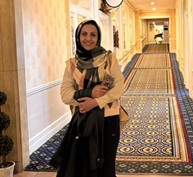Astrocyte Dysfunction Linked to Cerebellar Neurodegeneration: A New Study

"New Research Uncovers Astrocytes' Critical Role in Cerebellar Health and Neurodegeneration"
In a recent study, Dr. Masoumeh Zarei Kheirabadi, a postdoctoral researcher in Dr. Tomasz Kordula’s lab, in the Department of cellular, molecular, and genetic medicine (CMGM), revealed critical insights into the role of astrocytes in brain health. The research paper, titled "Defective Astrocyte Maturation Drives Cerebellar Neuroinflammation and Degeneration," by Dr. Kheirabadi, as one of the co-first authors, sheds light on how disturbances in astrocyte function can lead to neuroinflammation and degeneration within the cerebellum, the brain region essential for movement and coordination.
Astrocytes, a type of glial cell, are vital for supporting neuronal health and maintaining the brain's overall architecture. The study centers on a specific protein known as YY1, which plays a crucial role in the expression of astrocytic Atypical Protein Kinase C (APC). Through experiments conducted on mouse models, the research team showed that the absence of YY1 in astrocytes resulted in significant structural alterations within brain cells, triggered inflammatory pathways, and ultimately caused a loss of Purkinje cells—critical neurons that facilitate coordinated movement.
“Our goal was to understand how YY1 affects astrocyte structure and function,” Dr. Kheirabadi explained. “We found that astrocyte dysfunction alone can drive brain degeneration.” This revelation underscores the importance of astrocytes in not only supporting neurons but also in preventing neurodegenerative processes.
When asked what one key message she hopes readers will take from the paper, she emphasized: “YY1 supports astrocytic APC expression needed for β-catenin degradation and proper BG morphology. Dysfunction of astrocytes has widespread consequences for cerebellar integrity, function, and leads to neurodegeneration.”
The implications of this research are profound, offering potential new avenues for understanding and addressing neurodegenerative diseases. Co-authors of the study include Karli Mockenhaupt, Alexandra K. Gonsiewski, Avani Hariprashad, Lauren Dain, Johannes Verheijen, Sandeep K. Singh, and Tomasz Kordula, all of whom contributed to advancing our understanding of astrocyte biology and its implications for neurodegeneration.
By Chanelle Kamga and Usha Mahawar
Department of CMGM
kamganguekacb@vcu.edu and ushasaraswat.mahawar@vcuhealth.org
Date: 1 August 2025